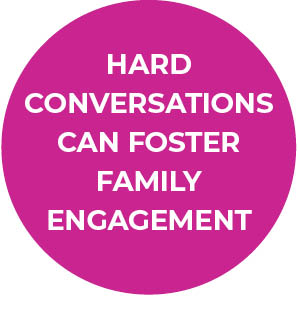Breakthroughs: Communicating with Parents

Cassie Hosler is an award-winning artist and art teacher at Church Hill and Sudlersville elementary schools, a new teacher mentor, and the Queen Anne’s County 2022 Teacher of the Year. She is a presenter at the district, state, and national levels on “Encouraging Communication with Parents in the Elementary Setting.”
Hearing the phone ring and seeing your child’s school on the caller ID after a long day of work can be stressful and discouraging for parents; we can even imagine their face cringing before they pick up. On our end, we may be feeling anxiety, stress, frustration, and even intimidation. Communicating with parents can be difficult. These conversations, however, are essential.
We may not know the difficulties and traumas children face outside of school hours and we don’t know what issues they bring with them to school. What we do know is that they need our love. Part of giving our love is teaching expectations for behavior and learning. Doing this while not knowing what is going on in students’ lives is an intense responsibility. Lasting behavioral changes are accomplished when parents and teachers communicate and share the responsibility of teaching students behavioral and learning expectations. This family and school partnership provides consistent reinforcement for positive behavior and is essential for success and the social and emotional well-being of a child.

Sharing this responsibility with parents can begin with asking questions which reinforce the role of parental involvement in helping improve their child’s success. “What strategies do you find successful for helping your child at home? What are some of the motivators at home that could be used in school? What role will you play at home to reinforce positive behaviors at school? What are some ways I can support you at home? How can we partner together to help make positive changes?” These conversation starters engage families in the reflection process to foster change both at home and at school.
Problematic situations happen in school. Parents need to know this. Families are sensitive when it comes to their children. They trust us with their children’s well-being as soon as they enter our classrooms. Being prepared for these conversations goes a long way. Taking notes of behaviors to use as talking points allows us to refocus during a stressful conversation. There is always something positive to say in every conversation and for every situation, and these words of encouragement come in handy. I keep some comments prepared such as “she has creative ideas,” “she starts her day full of excitement,” or “when she calms down, she’s able to independently redirect her behaviors.” These simple phrases can have a positive impact on the conversation.

I often become exhausted and frustrated when I know I have a difficult phone call to make at the end of the day. These calls can be draining and are often a negative way to end a long day. However, when those calls foster a family and teacher partnership with a common goal, they can save hours of future behavior management. To ensure that I do not end my school day with a negative attitude, for every difficult call home, I make two positive calls. These are quicker than you expect and really catch the parents off guard. “No need to worry, I just wanted to tell you something wonderful about today” provides a wave of relief for the parent. They are grateful, appreciative, and proud. These calls go a long way, too. I often give these calls to the children who can easily be overlooked in a class with behavior distractions. It is a really uplifting way to end the day, and I find it worth every second.
Purposely communicating with parents helps develop the success of a child, class, family, and teacher. Establishing family, teacher, and school relationships increases positive outcomes, fosters effective communication, and helps families develop trust in the teacher and their child’s education.

